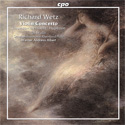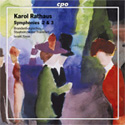| Record companies, artists and publicists are invited to submit CDs to be considered for review. Send to: Jerry Bowles, Editor, Sequenza 21, 340 W. 57th Street, 12B, New York, NY 10019 |
Latest Posts
Ernst Pepping and Allan Pettersson: Moral Dilemmas in Symphonic Music
"The numbers all go to eleven. Look, right across the board, eleven, eleven, eleven and... "
Tell the Birds
Soundtrack to an Apocalypse
Feast Your Ears: New Music for Piano
Gone For Foreign
Fred Lerdahl: Time After Time
Nothing Sacred
Two From Wayne Horvitz
Two Fresh Cantaloupes
Record companies, artists and publicists are invited to submit CDs to be considered for our Editor's Pick's of the month. Send to: Jerry Bowles, Editor, Sequenza 21, 340 W. 57th Street, 12B, New York, NY 10019



|
Archives
Saturday, December 18, 2004
Saturday, December 25, 2004
Friday, December 31, 2004
Wednesday, January 05, 2005
Monday, January 10, 2005
Thursday, January 13, 2005
Thursday, January 20, 2005
Sunday, January 23, 2005
Monday, January 24, 2005
Saturday, January 29, 2005
Wednesday, February 02, 2005
Thursday, February 03, 2005
Monday, February 07, 2005
Tuesday, February 08, 2005
Friday, February 11, 2005
Monday, February 14, 2005
Wednesday, February 16, 2005
Tuesday, February 22, 2005
Monday, February 28, 2005
Sunday, March 06, 2005
Monday, March 07, 2005
Wednesday, March 09, 2005
Sunday, March 13, 2005
Friday, March 18, 2005
Monday, March 28, 2005
Saturday, April 02, 2005
Monday, April 11, 2005
Sunday, April 17, 2005
Tuesday, April 19, 2005
Monday, April 25, 2005
Monday, May 02, 2005
Monday, May 09, 2005
Tuesday, May 17, 2005
Tuesday, May 31, 2005
Monday, June 06, 2005
Thursday, June 16, 2005
Sunday, June 19, 2005
Sunday, July 10, 2005
Wednesday, July 13, 2005
Sunday, July 24, 2005
Friday, July 29, 2005
Monday, August 08, 2005
Monday, August 22, 2005
Wednesday, August 24, 2005
Friday, September 16, 2005
Sunday, September 25, 2005
Tuesday, October 04, 2005
Tuesday, October 18, 2005
Monday, October 24, 2005
Tuesday, November 01, 2005
Monday, November 07, 2005
Saturday, November 12, 2005
Wednesday, November 16, 2005
Tuesday, November 29, 2005
Friday, December 16, 2005
Monday, January 09, 2006
Thursday, January 12, 2006
Thursday, January 19, 2006
Tuesday, January 24, 2006
Thursday, February 02, 2006
Monday, February 13, 2006
Wednesday, February 15, 2006
Wednesday, March 01, 2006
Sunday, March 19, 2006
Sunday, March 26, 2006
Friday, March 31, 2006
Sunday, April 09, 2006
Monday, April 10, 2006
Thursday, April 20, 2006
Friday, April 21, 2006
Thursday, May 11, 2006
Thursday, May 18, 2006
Saturday, May 20, 2006
Friday, June 02, 2006
Tuesday, June 06, 2006
Friday, June 16, 2006
Monday, June 19, 2006
Sunday, June 25, 2006
Monday, June 26, 2006
Monday, July 10, 2006
Thursday, July 13, 2006
Thursday, July 20, 2006
Friday, July 21, 2006
Sunday, July 23, 2006
Thursday, August 03, 2006
Wednesday, August 09, 2006

|
|
Wednesday, March 09, 2005
Two from CPO: Karol Rathaus and Richard Wetz
 History certainly extended the fuzzy end of the lollipop to composers Karol Rathaus (1895-1954) and Richard Wetz (1875-1935). Both lived lives of professional and personal disappointment, both died relatively young, and both have been forgotten by the music world ever since. Wetz's, Iím afraid, is purely a sad story: a musical autodidact who never got a break, the obscurist in me would love to cut him some posthumous slack. Unfortunately, the music on CPOís CD, a violin concerto and two vocal works with orchestra, reveals little in the way of expressive breadth and formal control. A follower of Liszt and Bruckner, Wetz lacked the technique and imagination to do much more than pulse around on augmented triads. His orchestration has an appealing glow to it, but itís not enough to sustain serious interest. History certainly extended the fuzzy end of the lollipop to composers Karol Rathaus (1895-1954) and Richard Wetz (1875-1935). Both lived lives of professional and personal disappointment, both died relatively young, and both have been forgotten by the music world ever since. Wetz's, Iím afraid, is purely a sad story: a musical autodidact who never got a break, the obscurist in me would love to cut him some posthumous slack. Unfortunately, the music on CPOís CD, a violin concerto and two vocal works with orchestra, reveals little in the way of expressive breadth and formal control. A follower of Liszt and Bruckner, Wetz lacked the technique and imagination to do much more than pulse around on augmented triads. His orchestration has an appealing glow to it, but itís not enough to sustain serious interest.
 Rathaus, however, is a find. A Jew who left Germany in 1932 shortly after embarking on an auspicious film-scoring career, he suffered many professional frustrations in Paris, London, and Hollywood, before settling down to teach at Queens College in 1940. CPO offers us his Second and Third Symphonies; the first dates from 1923, the second from two decades later. Both are fantastic and would flatter any orchestra willing to take them on. Rathaus, however, is a find. A Jew who left Germany in 1932 shortly after embarking on an auspicious film-scoring career, he suffered many professional frustrations in Paris, London, and Hollywood, before settling down to teach at Queens College in 1940. CPO offers us his Second and Third Symphonies; the first dates from 1923, the second from two decades later. Both are fantastic and would flatter any orchestra willing to take them on.
Rathausís Second received its premiere on the same concert as Bergís "Drei BruchstŁcke aus Wozzeck." Bergís piece was the toast of the town, whereas Rathaus's left both critics and audience members sharply divided. It is a surprise to read about the piece being dubbed a "test tube" work, for nothing seems further from its tempestuous, passionate sweep than the laboratory. Its four movements, played continuously, sustain massive amounts of tension, and every release is earned and exhilarating. Rathaus curbs his thorny, atonal idiom through wide voicings that lend his music a spaciousness unique among his German contemporaries. While the music, especially the searing conclusion, boasts moments of breathtaking ferocity, Rathaus, like Mahler, knows when to be small Ė as in the beautiful duet for solo viola and clarinet at the end of the third movement. Wonderful orchestral moments abound Ė brass fanfares, percussion ostinatos Ė magical moments where the smoke clears, and a choir of woodwinds emerges playing pungent harmonies that would hold their own against any twentieth century composer. Rathausís Second, in other words, is a real symphony, one to stand right beside those of Sibelius, Prokofiev, and Shostacovich.
The Third is more relaxed, and, while I didnít find its every burst of sunlight convincing, it is still a solid piece. More openly lyrical, traditional, and tonal than the Second, Rathaus nonetheless never lets the expressive profile of his music get one-dimensional. The lush third movement does recall Rachmaninoff, but it seems to me this music is more multi-layered, more complex. The second movement, a bright Scherzo, always seems just about to tip over into the grotesque and ironic Ė yet it never quite does.
I have to confess that Rathausís music is so good, it left me giddy at times. Iím really not someone to get excited about dead, forgotten composers: Iíd rather give the living a chance. But these two symphonies are hot pieces. The imagination and technique are of a very high caliber, and the charisma and flair of the music is hard to resist. Highly, highly recommended.
posted by David Salvage
12:30 AM
|
|




